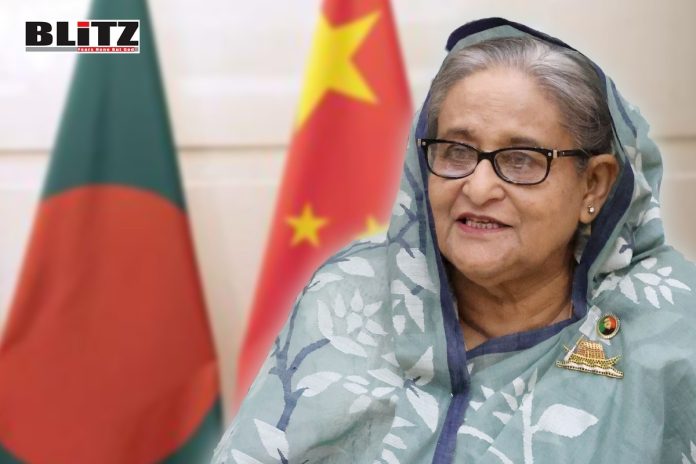In an era of global interdependence, diplomatic visits play a crucial role in fostering international relations and strengthening partnerships. Bangladesh Prime Minister Sheikh Hasina’s upcoming visit to China, expected in July this year, holds significant promise for the deepening of the longstanding and mutually beneficial relationship between the two countries. As China extends an official invitation to Sheikh Hasina, the expectations surrounding this visit encompass diverse sectors, from economic collaboration and infrastructure development to cultural exchanges and strategic cooperation.
On January 28, 2024 while meeting Bangladesh Foreign Minister Dr Hasan Mahmud, Chinse Ambassador to Bangladesh, Yao Wen said, China has invited Sheikh Hasina to pay an official visit to Beijing as the country is ready to work with the new government of Bangladesh for further deepen mutually beneficial and friendly cooperation in all field.
Earlier, Prime Minister Hasina officially visited China from July 1-6, 2019. She also participated in the 13th Summer Davos Forum in Dalian. During the visit, Hasina called on Chinese President Xi Jinping. On August 23, 2023 Chinese Bangladesh Prime Minister Sheikh Hasina met Chinese President Xi Jinping on the sidelines of the BRICS Summit in South Africa.
Historical context of China-Bangladesh relations
The foundation of the China-Bangladesh relationship was solidified in 2016 when the two countries elevated their ties to a strategic cooperative partnership. President Xi Jinping’s successful state visit to Bangladesh marked a milestone, fostering traditional friendship and setting the stage for deeper cooperation. Over the years, both nations have collaborated on numerous fronts, encompassing economic, political, and cultural dimensions.
Bangladesh stands as a prominent partner in China’s Belt and Road Initiative (BRI), with substantial investments and construction projects. According to the American Enterprise Institute (AEI), China’s total investment in Bangladesh has reached US$7.07 billion, with an additional US$22.94 billion in construction contracts awarded to Chinese companies. The BRI investments, as highlighted by Ambassador Yao Wen, have contributed significantly to improving the living standards of the Bangladeshi people.
Anticipated agendas for Sheikh Hasina’s visit
Bangladesh Prime Minister Sheikh Hasina’s visit to China provides an opportune moment to further strengthen economic ties. Both countries can explore collaboration in solar-power generation projects, heavy industries, and the expansion of Bangladesh’s apparel industry into the Chinese market. The mutual economic benefit derived from such partnerships can foster sustainable development in both nations.
China’s involvement in Bangladesh includes the implementation of 21 bridges and 27 power projects. With a focus on continued infrastructure development, the upcoming visit may see discussions on new projects and avenues for cooperation in critical sectors such as transportation and energy.
As technology plays an increasingly vital role in global progress, collaboration in the educational and technological sectors becomes imperative. Sheikh Hasina can explore opportunities for enhanced collaboration between Chinese and Bangladeshi educational institutions, particularly in the field of Artificial Intelligence. Such initiatives can contribute to skill development and knowledge exchange.
It is essential to mention here that China has emerged as a global leader in the field of Artificial Intelligence (AI), making significant strides in research, development, and deployment. The country has embraced AI as a key driver of economic growth and technological innovation, with robust government support and substantial investments from both public and private sectors.
China’s ambitious AI development plans are outlined in initiatives such as the New Generation Artificial Intelligence Development Plan, released in 2017, which aims to make significant breakthroughs and establish the country as the world leader in AI innovation by 2030.
One of the key contributors to China’s AI advancements is the thriving ecosystem of tech giants and startups, such as Baidu, Alibaba, and Tencent, which have played pivotal roles in pushing the boundaries of AI research and application. These companies leverage vast datasets and invest heavily in talent, driving breakthroughs in natural language processing, computer vision, and machine learning. Additionally, China’s government has fostered collaborations between academia, industry, and research institutions, creating a conducive environment for interdisciplinary research and development in AI.
China’s AI prowess is not limited to domestic developments; the country actively participates in global AI initiatives and collaborations. Chinese researchers and companies frequently contribute to international conferences and publications, fostering a dynamic exchange of ideas and knowledge. As China continues to push the frontiers of AI technology, the global community is witnessing the transformative impact of Chinese innovations on various sectors, from healthcare and finance to manufacturing and autonomous systems. China’s advancements in AI underscore its commitment to shaping the future of technology and harnessing the potential of artificial intelligence for societal benefit and economic growth.
Additionally, Bangladesh can seek Chinese collaboration in tourism sector as country’s scenic beauty has the potential to attract international tourists. Collaboration with China in the development of the tourism industry, including initiatives to transform St. Martin islands into a prime destination, can open new avenues for economic growth and cultural exchange.
The strategic partnership between China and Bangladesh goes beyond economic ties. Both nations share a commitment to safeguarding national sovereignty, independence, and territorial integrity. Discussions during the visit may include strategies for enhancing cooperation on global platforms such as BRICS and addressing common challenges.
As Bangladesh Prime Minister Sheikh Hasina prepares for her visit to China, the expectations are high for further elevating the strategic cooperative partnership between the two nations. The historical foundation, coupled with significant investments and projects under the Belt and Road Initiative, provides a solid framework for continued collaboration. From economic ventures to educational partnerships, the potential areas of cooperation are diverse and promising. The upcoming visit not only holds the promise of strengthening bilateral ties but also signifies the shared commitment of China and Bangladesh to a future of prosperity, development, and global cooperation.




